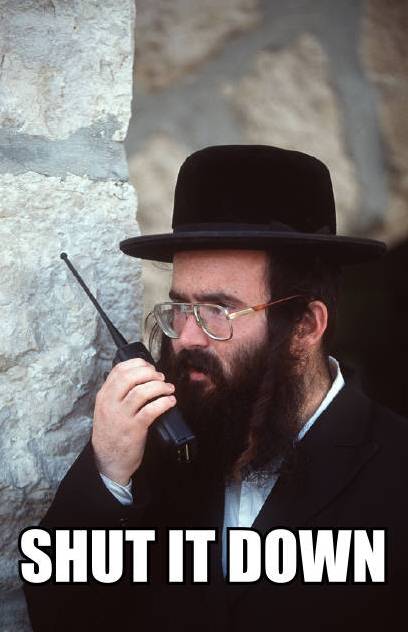Stuff Black People Don’t Like
December 10, 2014
It has to be a monologue.
A one-way street.
No conversation, just dictating.
Deviation from the goal of ascribing all blame for black dysfunction on “deeply rooted” white racism and white privilege (the latter evil a reason to excuse the black riots/arson/violence in Ferguson) will not be tolerated in polite, Eric Holder-approved discussions.

When the Department of Justice wasn’t demanding white Ferguson Police Officers remove “I am Darren Wilson” bracelets (creating in the words of DOJ official an “Us vs. Them” mentality), they were busy conducting seminars equating vestiges of white privilege in the less than 27 percent white St. Louis suburb with the declining conditions of the city. [The Department of Social Justice: Federal officials lectured Ferguson residents about “white privilege.”, National Review, 12-8-14]:
When Department of Justice officials arrived in Ferguson, Mo., one day after the death of Michael Brown, it wasn’t just to conduct an investigation on potential civil-rights violations. In fact, officials from one Justice Department office were conducting meetings with Ferguson residents to educate them on subjects such as “white privilege.”
The DOJ’s Community Relations Service arrived in Ferguson purportedly to lessen the tension between protesters and city officials. But sources who attended the DOJ’s private gatherings with Ferguson residents tell NRO that the Justice Department also sought to educate and question the community about the issues of white privilege and racism. The political nature of the Justice Department’s intervention in Ferguson may not be exclusive to its interactions with residents; it also might have affected its ongoing investigations into the Ferguson Police Department and officer Darren Wilson.
As investigators combed through Ferguson, DOJ’s Community Relations Service began holding the town-hall meetings, which excluded press and everyone from out of town. Ferguson resident Audrey Watson, 47, attended one of the meetings. She says federal officials organized the attendees into small groups and asked questions such as “What stereotypes exist in our community?” “How does white privilege impact race relations in our community?” and “Is there a need for personal commitment to race relations?”
Hundreds of people attended the fall meetings, including Ferguson mayor James Knowles III, who says many people at the initial meetings were angry and screaming. Knowles says the Community Relations Service officials told him they had previously responded to Trayvon Martin’s death in Sanford, Fla., and that they were there to help. During the meetings, he says, the DOJ officials talked about underlying racism that people may not perceive, and the issue of white privilege.
“I mean, I think it was really just trying to get people to understand what that [white privilege] means, because the average white person wakes up and says, if you’re just a middle-class white person, you say, What privilege do I have?”
Knowles says. “But until you really understand the systemic issues and maybe some of those not-visible things that exist in society, which affect African Americans or other persons of color, you may not really understand what that is.”
Systemic issues?
The virus of ‘white privilege’ has invaded the minds of so many white people, willing to believe any excuse for the collective depravity of black individuals that completely dismantles all social conditions required to be deemed a ‘community’, except the most obvious: genetic differences.
The Lessons of Ferguson, as the St. Louis Post-Dispatch would have you believe, are the inevitable rise of the voiceless to the terrible, terrible legacy of slavery, opposition to poor performing black schools, lack of economic activity in majority black municipalities, and a lack of racially-proportional democratic representation.
Never mind the obvious reason majority black schools are academic wastelands (because of the individual black students collectively performing poorly on tests designed with white students in mind, dropping out school, and assaulting fellow students and teachers); never mind the obvious reason businesses close in once-flourishing majority white cities now economically blighted when the population is majority black (because black people lack purchasing power necessary for maintaining a business district and attracting investors outside of check cashing and title loan stores); basically, the insidious residue of white privilege covering contemporary whites – like Bill Murray after encountering Slimer in Ghostbusters – is the primary reason the near majority of mortgages in Ferguson were underwater even before Michael Brown challenged Officer Darren Wilson with, “What the fuck are you gonna do?”
And because the continued lecture against ‘white privilege’ and ‘white racism’ must be conducted by only those who agree all ills in the black community (sic) have a Klansman as a source to blame, the St. Louis Post-Dispatch has taken the cowardly steps to disabling all comments on items published in the opinion section. [Editorial: No comments. An experiment in elevating the conversation, 12-8-14]:
For the next two months, we are turning off the comment function on all editorials, columns and letters in the opinion section.
Why?
Ferguson.
Last Sunday, we challenged our region to have the serious discussion on race that it has been avoiding for decades. Such difficult discussions are made more challenging when, just to present a thoughtful point of view, you have to endure vile and racist comments, shouting and personal attacks.
Ever since newspapers started putting stories on the Internet, there has been a vigorous debate within the industry about the effect of reader comments. The Post-Dispatch has made efforts to improve the level of discussion in comment sections, but there are wins and losses.
There are positive moments, such as when readers last week left touching tributes in comments about sports columnist Bryan Burwell after he lost his battle with cancer. But there are other instances where comments deteriorate into racist remarks or demeaning discussion that has nothing to do with the original story or editorial or column.
Recently, the news service Reuters decided to get rid of comments on its stories. The online startup Vox doesn’t allow commenting.
We intend to use our opinion pages to help the St. Louis region have a meaningful discussion about race. So we are going to turn off the comments in the editorial section for a while, and see what we learn from it. (Comment will continue on news articles). Comments might return to the opinion pages. Or we might find that without them, the discussion — through letters, social media conversations and online chats, rises to a higher level.
That’s the goal.
There will still be plenty of ways to share your thoughts with us, and, in fact, we’ll be more likely to see them and take them seriously through other venues. As always, you can send us letters to letters@post-dispatch.com. You can email Editorial Page Editor Tony Messenger at tmessenger@post-dispatch.com or find him on Twitter at @tonymess. Our editorial page Twitter account is @PDEditorial.
Also, starting this week, we plan a weekly live chat to discuss the various issues surrounding Ferguson. Details will be posted on our website and social media platforms.
To be clear: It’s not that we don’t want to hear from those who disagree with us.
Quite the contrary. Every day we publish letters from people criticizing our editorials, and we engage in discussions on Twitter and Facebook about the things we write. We believe those venues offer a safer, more civil place to talk about the racial injustice that dominates the Ferguson discussion.
Let’s give civility a try.
Civility?
You mean sticking with a narrative that inevitably led to black people burning down the business district of Ferguson, attacking a white man and killing him with repeated hammer blows, and pulling white women out of their cars and attacking them?
Every failure of the black community is racially motivated on the part of whites hoping to forever oppress a people whose primary contribution to life in St. Louis is the need for more police to patrol their crime-infested streets and neighborhoods… right, St. Louis Times-Dispatch?
Everything involving black people in St. Louis is racially motivated until it isn’t, as in the time the St. Louis Times-Dispatch labeled the uniquely black Knockout Game just part of ‘the spirit of the times’:
It’s hard to judge how bad a problem the so-called“knockout game” really is. But because it has resulted in the death of 72-year-old man, left at least a half a dozen other people injured and reinforced fears about the safety of city neighborhoods, it’s bad enough.
Roving bands of teenagers slugging people just for the hell of it? That takes us into “A Clockwork Orange” territory.
It has reached the point that it has triggered an all-out response by the St. Louis Police Department. Top investigators and a special police squad have been assigned. A prosecutor has been designated to focus on the cases.
Reporter Denise Hollinshed of the Post-Dispatch talked to some kids outside of Roosevelt High School, one of whom acknowledged that he’d taken part in the “knockout king” game.
“Knockout king is a thrill,” the kid told her. “It makes you want to keep doing it every day.”
Sure, the kid said, he knew he could hurt somebody. But he added, “You don’t know them, so why care about hurting them?”
That’s a chilling statement. It reflects an almost sociopathic lack of empathy.On the other hand, the more you think about it, it perfectly captures today’s zeitgeist, the spirit of the times.
No, the ‘spirit of the times’ is the continued one-way conversation by those managers of the system of racial governance/bureaucracy known as Black-Run America (BRA), dedicated to the promulgation of only goal: The proposition that all white people are endowed with white privilege by their ancestors, ultimately only capable of being removed by a stealthy course of action; nothing more than genocide.
The goals of the revolution in San Domingo (Haiti) are being played out in America under the guise of whites atoning for the sins of their ancestors daring to create a country that every non-white in the world actively tries to immigrate to; the world those actively demanding white people acquiesce to by checking their privilege looks an awful lot like East St. Louis and Camden.
Never forget the goal of pushing ‘white privilege’ as a new paradigm in governing white relations with non-whites (past, present, and future relations, mind you) is to create a morality where the continued erosion of white political power is not only ensured, but the gradual disappearance of whites is all but assured.
